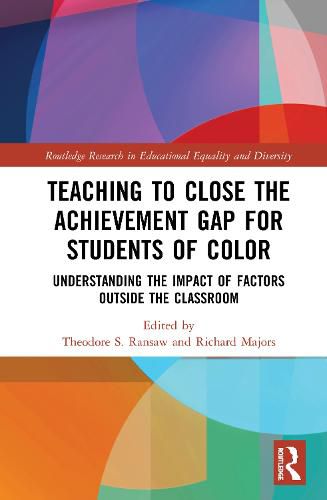Readings Newsletter
Become a Readings Member to make your shopping experience even easier.
Sign in or sign up for free!
You’re not far away from qualifying for FREE standard shipping within Australia
You’ve qualified for FREE standard shipping within Australia
The cart is loading…






This volume highlights approaches to closing the achievement gap for
students of color across K-12 and post-secondary schooling. It uniquely
examines factors outside the classroom to consider how these influence
student identity and academic performance.
Teaching to Close the Achievement Gap for Students of Color offers
wide-ranging chapters that explore non-curricular issues including
trauma, family background, restorative justice, refugee experiences, and
sport as determinants of student and teacher experiences in the classroom.
Through rigorous empirical and theoretical engagement, chapters
identify culturally responsive strategies for supporting students as they
navigate formal and informal educational opportunities and overcome
intersectional barriers to success. In particular, chapters highlight how
these approaches can be nurtured through teacher education, effective
educational leadership, and engagement across the wider community.
This insightful collection will be of interest to researchers, scholars,
and post-graduate students in the fields of teacher education, sociology
of education, and educational leadership.
$9.00 standard shipping within Australia
FREE standard shipping within Australia for orders over $100.00
Express & International shipping calculated at checkout
This volume highlights approaches to closing the achievement gap for
students of color across K-12 and post-secondary schooling. It uniquely
examines factors outside the classroom to consider how these influence
student identity and academic performance.
Teaching to Close the Achievement Gap for Students of Color offers
wide-ranging chapters that explore non-curricular issues including
trauma, family background, restorative justice, refugee experiences, and
sport as determinants of student and teacher experiences in the classroom.
Through rigorous empirical and theoretical engagement, chapters
identify culturally responsive strategies for supporting students as they
navigate formal and informal educational opportunities and overcome
intersectional barriers to success. In particular, chapters highlight how
these approaches can be nurtured through teacher education, effective
educational leadership, and engagement across the wider community.
This insightful collection will be of interest to researchers, scholars,
and post-graduate students in the fields of teacher education, sociology
of education, and educational leadership.